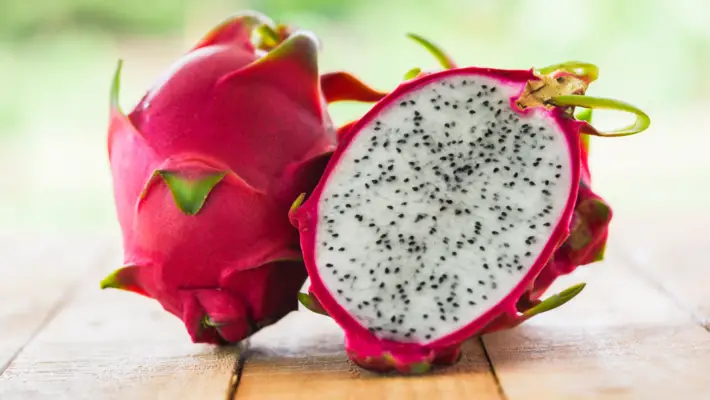Dragon fruit, also known as pitaya, is a rare and nutritious fruit that has become increasingly popular in recent years. Its unique look and taste make it stand out among other fruits. Dragon fruit has a soft sweet taste and contains many vitamins and antioxidants that are great for human health. But can our canine companions also enjoy this tropical fruit? Let’s take a closer look at whether dogs can eat dragon fruit.
What is Dragon Fruit?
Dragon fruit grows on a climbing cactus plant called Hylocereus that is native to tropical regions of Mexico and South America. The most common types of dragon fruit are red dragon fruit (Hylocereus polyrhizus) and white dragon fruit (Hylocereus undatus).
Dragon fruit gets its name from its scaly, flame-like pinkish-red skin. The inside flesh is white or red in color with tiny black seeds spread throughout. The taste is often described as a mild sweet mix between a kiwi and a pear.

This superfood is low in calories but packed with vitamin C, antioxidants, fiber, iron, and other key nutrients. Dragon fruit may help boost immunity, improve digestion, aid heart health, and stabilize blood sugar levels.
Is Dragon Fruit Safe For Dogs To Eat?
The short answer is yes, dogs can eat dragon fruit as an occasional treat. Dragon fruit is non-toxic and completely safe for dogs to consume. Many dogs enjoy the mild sweet taste of this fruit.
Like with any new food, it’s best to start by giving your dog just a small portion of dragon fruit. Make sure to monitor them for any adverse reactions. Diarrhea or upset stomach could indicate an intolerance.
Dragon fruit flesh, seeds, skin, flowers, and stems are all safe parts your dog can eat. The seeds add fiber. You can serve it fresh cut into slices, blended into a smoothie, or frozen for a refreshing treat.
Nutritional Benefits of Dragon Fruit for Dogs
Dragon fruit is low in fat, protein, and sodium, making it a healthy snack option for dogs. Here are some of the top nutrients and benefits dragon fruit provides:
- Vitamin C – Supports immune function and aids collagen formation.
- Iron – Helps carry oxygen in the blood and aids metabolism.
- Fiber – Promotes digestion and gut health.
- Antioxidants – Helps neutralize free radicals and prevent disease.
- Calcium – Important for bone health and muscle function.
- Magnesium – Helps regulate blood pressure and blood sugar.
- B Vitamins – Important for converting food into energy.
The combination of vitamins, minerals, and antioxidants in dragon fruit can help boost your dog’s overall health and nutrition. It’s a low-calorie snack packed with important nutrients dogs need.
Potential Concerns of Feeding Dragon Fruit to Dogs
While dragon fruit is safe for dogs to eat, there are a couple of precautions pet owners should keep in mind:
- Allergies – Some dogs may be allergic or intolerant to dragon fruit. Discontinue feeding if you notice any signs of an allergic reaction.
- Diarrhea – Too much dragon fruit could lead to loose stools or diarrhea. Feed in moderation.
- High sugar – Dragon fruit contains natural sugars. Avoid overfeeding to pets prone to obesity or diabetes.
- Choking hazard – The small black seeds could present a choking risk. Take care when serving.
- Pesticides – Only feed organic dragon fruit or wash thoroughly to avoid pesticide exposure.
As long as you monitor your dog for any negative reaction and introduce dragon fruit slowly in moderation, it can be a nutritious occasional treat. Discontinue use if you notice any signs of digestive upset or allergic reaction.
How Should I Serve Dragon Fruit to My Dog?
There are many ways you can add dragon fruit into your dog’s diet. Here are some simple serving tips:
- Fresh slices – Cut slices or cubes to pop straight into your dog’s mouth for a tasty treat.
- Fruit salad – Dice up dragon fruit to mix in with other fresh fruits like banana, apple, or mango.
- Frozen treats – Blend and freeze pureed dragon fruit in ice cube trays for a cooling summer snack.
- Smoothies – Combine dragon fruit with yogurt, peanut butter, or low-fat milk for a nutritious drink.
- Topper – Mash dragon fruit and spoon a dollop over your dog’s regular kibble.
- Dehydrated chips – Dehydrate thin slices of dragon fruit to make chewy fruit chips.

No matter how you choose to serve it, be sure to introduce dragon fruit slowly in small amounts and monitor your dog for any gastrointestinal issues. Moderation is key when feeding high-sugar fruits.
Final Thoughts
Dragon fruit can be a tasty and beneficial snack for dogs to eat in moderation. This Unfamiliar superfood is packed with essential vitamins, minerals, and antioxidants that can complement your dog’s regular diet. Feed just small portion sizes at first to make sure your dog tolerates it well. Always supervise your pet when serving new foods and discontinue use if any negative reaction occurs. With its mild sweet flavor and stellar nutritional profile, dragon fruit can be a nutritious canine treat when fed responsibly.










